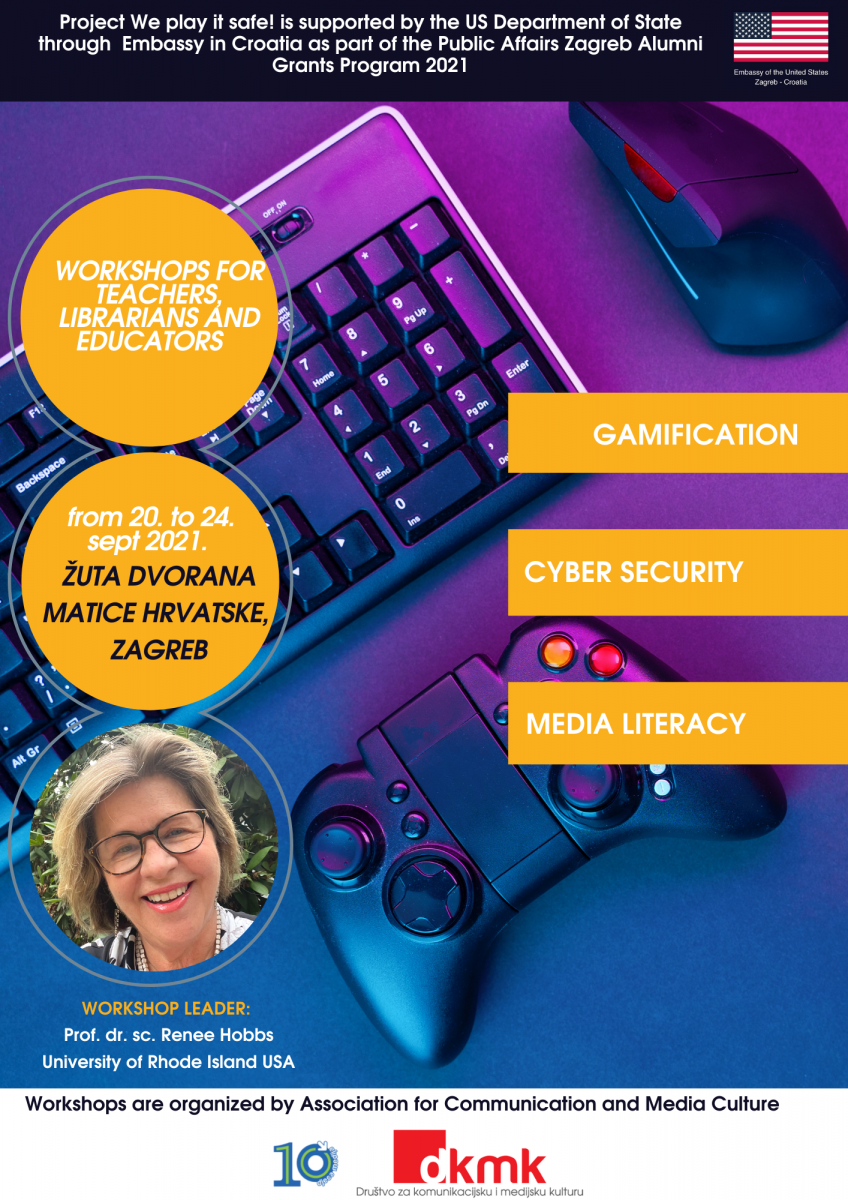 The purpose of We Play it Safe! is to advance the quality of media literacy education in Croatia through a professional development program that uses gamification pedagogies to explore algorithmic personalization, data surveillance, and the digital economy. Game-based experiential learning has been increasingly recognized as an effective educational tool for its ability to engage students, prompt emotional investment and enable them to process complex concepts through ‘learning by doing.’ However, most teachers don’t understand how to make good games. They don’t know the essential components of games such as mechanics, feedback, and goals.
The purpose of We Play it Safe! is to advance the quality of media literacy education in Croatia through a professional development program that uses gamification pedagogies to explore algorithmic personalization, data surveillance, and the digital economy. Game-based experiential learning has been increasingly recognized as an effective educational tool for its ability to engage students, prompt emotional investment and enable them to process complex concepts through ‘learning by doing.’ However, most teachers don’t understand how to make good games. They don’t know the essential components of games such as mechanics, feedback, and goals.
DATES: Monday, September 20 - Friday, September 24
LOCATION: Zuta Dvorana Matice Hrvatske, Zagreb Croatia
MONDAY RESOURCES
- Bingo Get To Know You
- Go Viral Game
- Four Corners Go Viral Reflection
- Love It, Hate It Game
- Introduction to Game Design - Anahita Dalmia
TUESDAY RESOURCES
- Two Truths and a Lie
- Google Search Propaganda
- Google Your Partner
- What Does Google Know About You?
- Readiing: Big Tech is Spying on Your Wallet
- Agents of Influence - Anahita Dalmia
- Agents of Influence - Slides
WEDNESDAY RESOURCES
- Disinformation in Croatia
- Video: How Ads Follow You Around the Internet
- Excplore the Facebook Ad Library
- Big Tech is Spying on Your Wallet
- Compass Points
- Playtesting
THURSDAY RESOURCES
FRIDAY RESOURCES
- Shared Folder for Photos and Videos
- Mirko Elic and Media Literacy: A Collaborative Slide Deck
- Final Game Sharing Slides - The Games We Created
As the main activity of We Play it Safe! we offer an intensive online and face-to-face professional development seminar with Croatian teachers, piloting an approach to professional learning that includes gamification, where through role-playing and solving challenges, learners gain new insight on machine learning, cybersecurity, data surveillance, and other topics associated with the rise of algorithmic personalization. To help educators build knowledge and skills, we will model and demonstrate a variety of learning activities using gamification to introduce ideas about machine learning, cybersecurity, data surveillance, and algorithmic personalization. For example, we will play games and deconstruct and analyze them to understand how different mechanics work together to create immersive engagement. Participants will also work collaboratively to create simple games that can be used with their own Croatian students. Consequently, we will have a number of potentially valuable design concepts by the end of this workshop that may later be developed into multimedia educational games through subsequent cycles of design and implementation after the official end of the program.
Qualifications of the Team Members
Igor Kanižaj serves as Project Director and Renee Hobbs serves as Teacher Education Program Director for the project. She is a professor of communication studies and Director of the Media Education Lab at the University of Rhode Island. She has authored 12 books and 150 scholarly and professional articles on media literacy education and offered professional development programs in media literacy education on four continents. Her 2020 book Mind Over Media: Propaganda Education for a Digital Age offers a close look at the pedagogy of media literacy with a special focus on contemporary propaganda, including the algorithmic personalization of entertainment, information, and persuasion. Anahita Dalmia will provide support for the implementation of the game concept. She is a recent graduate of the University of Southern California, where she founded Alterea, an experience design company specializing in interactive education and entertainment.
Project Goals
GOAL 1. Increase people’s understanding of data surveillance as a commodity that drives the economics of the Internet.
GOAL 2. Expand the number of current teachers in Croatia with the confidence to use gamification to introduce media literacy education to learners.
GOAL 3. Participants demonstrate growth in generating “how” and “why” questions when they encounter algorithmic personalization, applying media literacy concepts like political economy, machine learning, representation, bias, target audience, purpose, and techniques.
GOAL 4. To encourage librarians, teachers and professional associates to use the acquired knowledge to improve communication and media literacy in their schools by the usage of gamification for learning.
GOAL 5. To help parents understand the appeal of video games while increasing their understanding of potentially addictive qualities of games as a means to help people become more responsible media consumers.